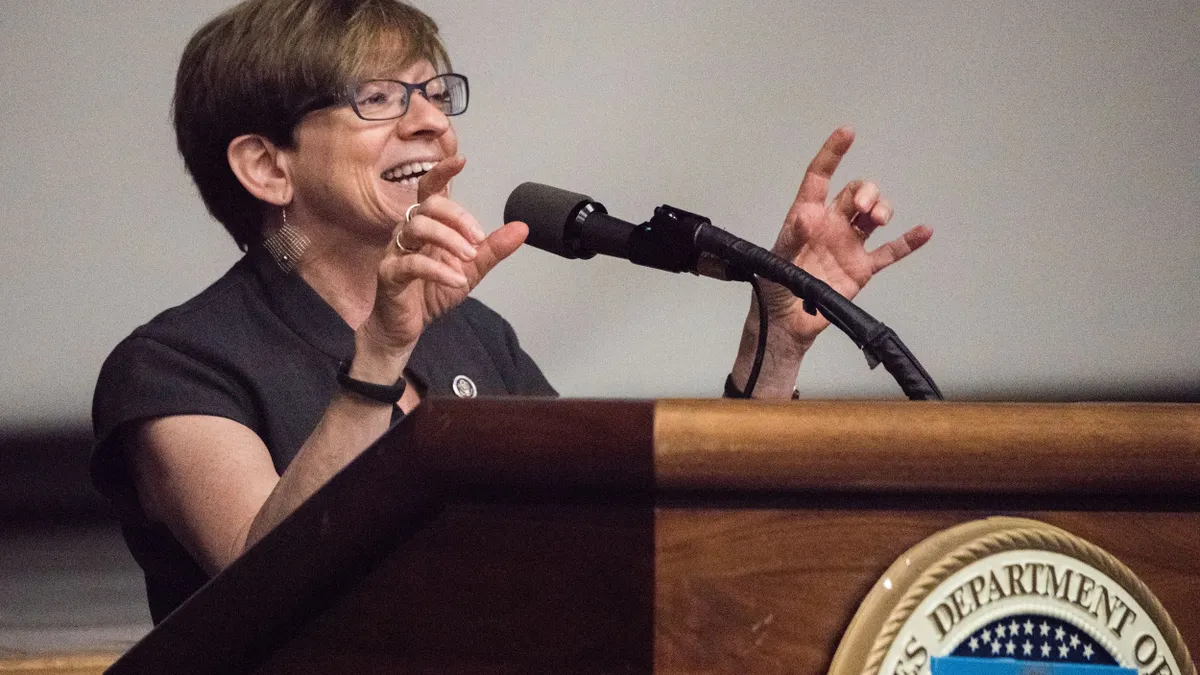Dive Brief:
- Chai Feldblum, former Democratic commissioner for the U.S. Equal Employment Opportunity Commission, said in a LinkedIn post Thursday that employers may consider certain framings for their diversity, equity and inclusion initiatives after the U.S. Department of Justice published a memo targeting private-sector DEI programs.
- Attorney General Pam Bondi’s Feb. 5 memo stated that DOJ would “investigate, eliminate and penalize” DEI programs that “discriminate, exclude, or divide individuals based on race or sex.” The memo is a follow up to President Donald Trump’s Jan. 21 executive order directing federal agencies to crack down on DEI in the private sector.
- Specifically, Feldblum said that employers could state that they are committed to creating inclusive and fair workplaces and ensuring that no person is discriminated against on the basis of race or sex. Employers also may state that they operate a community in which “everyone works together,” in reference to Bondi’s focus on divisive DEI programs. Feldblum said her thoughts were not legal advice and that employers should seek legal counsel.
Dive Insight:
Feldblum expressed some confusion about aspects of Bondi’s memo, particularly the attorney general’s focus on programs that “divide” individuals based on race or sex. She said she questioned whether courts would adopt DOJ’s approach toward DEI as well as accessibility programs moving forward.
“The question is – How will DOJ interpret the terms ‘discriminate,’ ‘exclude’ and ‘divide’? (What the hell does ‘divide’ mean anyway?),” Feldblum wrote. “If DOJ interprets those terms too broadly, I think it will have trouble in the courts — even with the courts we have now.”
Feldblum served at EEOC during the first Trump administration and prior to the U.S. Supreme Court’s 2020 decision extending the antidiscrimination protections of Title VII of the Civil Right Act on the basis of sexual orientation and gender identity. At the time, Feldblum and the rest of EEOC openly clashed with the Trump administration over the inclusion of LGBTQ+ protections in Title VII.
Feldblum’s comments follow those from officials at HR industry group SHRM, which encouraged organizations to continue DEI work while acknowledging the need for changes. Emily Dickens, chief of staff, head of government affairs and corporate secretary at SHRM, said during the organization’s Jan. 24 briefing that Trump’s targeting of DEI represented “an opportunity to evaluate and elevate” and determine how employers are balancing compliance with inclusion.
Management-side attorneys had similar reactions to the Trump administration’s efforts. In a Jan. 31 opinion piece for HR Dive, Jonathan Segal, partner at Duane Morris, wrote that employers may consider auditing DEI programs to identify and eliminate potentially unlawful programs, including those that create hiring quotas or de facto quotas. Segal also said employers should “do more than play defense,” which may take the forms such as defining diversity broadly and training managers on hiring and promoting.
Eric Meyer, partner at Pierson Ferdinand, said in a blog post Friday that employers should review their policies, train HR and managers on “merit-based practices” and refine their DEI messaging to focus on unity and equal opportunity.
“Employers should evaluate their current policies to ensure qualifications, skills, and performance drive decisions,” Meyer added. “The goal is to build inclusive workplaces without resorting to discriminatory practices.”
In the meantime, Bondi set a March 1, 2025, deadline for DOJ to submit a report containing recommendations for encouraging the private sector to end DEI programs. Employers are divided on the subject; while big names like Costco have stood by their programs, others including Amtrak and Booz Allen Hamilton have rolled back their own since Trump issued his executive order, according to Bloomberg.













